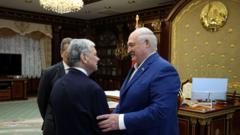Will Belarus Release Political Prisoners to Lift US Sanctions?

Published: 2025-09-11 19:00:14 | Category: world
This article explores the recent release of political prisoners in Belarus, a significant diplomatic move between Alexander Lukashenko's regime and the United States under Donald Trump. Fifty-two prisoners, including notable activists and journalists, were freed as part of an agreement that will also see some sanctions on Belarusian airline Belavia lifted. However, thousands remain incarcerated, highlighting the ongoing human rights concerns in the country.
Last updated: 26 October 2023 (BST)
Key Takeaways
- Fifty-two political prisoners were released in Belarus amid a diplomatic deal with the US.
- Over 1,000 political prisoners remain in Belarusian jails.
- Sanctions on Belarusian airline Belavia have been partially lifted in exchange for the prisoner release.
- The release coincided with military exercises involving Belarus and Russia, raising regional tensions.
- Human rights groups express concerns over continued repression in Belarus.
The Context of the Prisoner Release
The release of the political prisoners comes as part of a broader diplomatic strategy by both the US and Belarus. Alexander Lukashenko, Belarus's long-standing leader, has faced international isolation due to his authoritarian rule and the government's brutal response to protests following the disputed presidential elections of August 2020.
In these elections, Lukashenko claimed victory amidst widespread allegations of electoral fraud, prompting massive protests which were met with severe crackdowns involving mass arrests and violence. As of now, estimates suggest that more than 1,000 political prisoners remain behind bars, many of whom have been detained under dubious charges.
Details of the Agreement
The diplomatic negotiations culminated in the release of 52 prisoners, a gesture Lukashenko described as humanitarian. Among those released were trade union leaders, journalists, and significant opposition figures, including Mikola Statkevich, a former presidential candidate.
In return, the United States has announced a partial lifting of sanctions on the state-owned airline Belavia. These sanctions were imposed after a high-profile incident in May 2021, when Belarusian authorities forced a Ryanair flight to land in Minsk, leading to the arrest of journalist Roman Protasevich.
Reactions from the International Community
The release of prisoners has elicited mixed responses. While some see it as a positive step towards improving Belarus's relations with the West, others caution that it may simply be a tactical move by Lukashenko to alleviate international pressure. Poland, which has seen increased military tensions due to the ongoing Zapad-2025 military exercises with Russia, has responded by closing its borders with Belarus, further complicating the dynamics in the region.
Kaja Kallas, the EU’s foreign policy chief, has voiced concerns about the implications of this agreement, suggesting that it undermines Western efforts to hold Lukashenko accountable for his regime's actions.
The Impact on Human Rights in Belarus
Despite the release of these prisoners, the human rights situation in Belarus remains dire. Human rights organisations, including Viasna, continue to document cases of repression, arbitrary detentions, and the use of violence against dissenters. The released individuals, while now free, often face the grim reality of exile, as many are not allowed to return to their homeland.
For example, former journalist Larissa Shchyrakova expressed her bitterness about being expelled after serving her sentence, highlighting the ongoing struggle for those who oppose the regime. Additionally, the release of some prisoners has been accompanied by forced exile, which raises questions about the true nature of their freedom.
The Broader Geopolitical Implications
This recent development is part of a more extensive geopolitical context involving Russia and the US. Lukashenko's willingness to engage with Trump could signal a shift in Belarus's foreign policy, particularly as the country seeks to distance itself from Russia's overwhelming influence. The timing of the prisoner release on the eve of joint military exercises with Russia underscores the delicate balance Belarus is attempting to maintain.
Furthermore, the US's engagement with Lukashenko suggests a potential thawing of relations, which had been severely strained since the invasion of Ukraine. The prospect of reopening the US embassy in Minsk, although still uncertain, points to a potential new chapter in diplomatic relations.
What Lies Ahead for Belarus?
Looking forward, the situation in Belarus remains fluid. While the release of political prisoners could be perceived as a positive step, significant challenges remain. More than a thousand political prisoners are still incarcerated, and the international community continues to watch closely for further developments. The dynamics of Belarus's relationship with both the US and Russia will likely influence its future direction.
As Belarus navigates this complex landscape, the ongoing repression of dissent and the human rights situation will remain focal points for activists and international observers alike. The road ahead may be fraught with challenges, but the recent developments signal a potential shift worth monitoring.
FAQs
What prompted the release of political prisoners in Belarus?
The release was part of a diplomatic agreement between Belarusian leader Alexander Lukashenko and US President Donald Trump, aimed at improving relations and mitigating sanctions.
How many political prisoners remain in Belarus after this release?
Despite the release of 52 prisoners, it is estimated that over 1,000 political prisoners remain incarcerated in Belarus.
What are the implications of lifting sanctions on Belavia?
Lifting sanctions on Belavia allows the airline to purchase necessary parts, potentially easing the financial strain on the airline while raising concerns about the regime's continued repression.
What has been the response from human rights organisations?
Human rights organisations have expressed concern that the release of prisoners does not equate to improvement in human rights conditions, as many released individuals face exile rather than true freedom.
What is the significance of the timing of the prisoner release?
The release coincided with joint military exercises between Belarus and Russia and follows heightened tensions in Eastern Europe, indicating a strategic diplomatic manoeuvre amidst regional instability.



